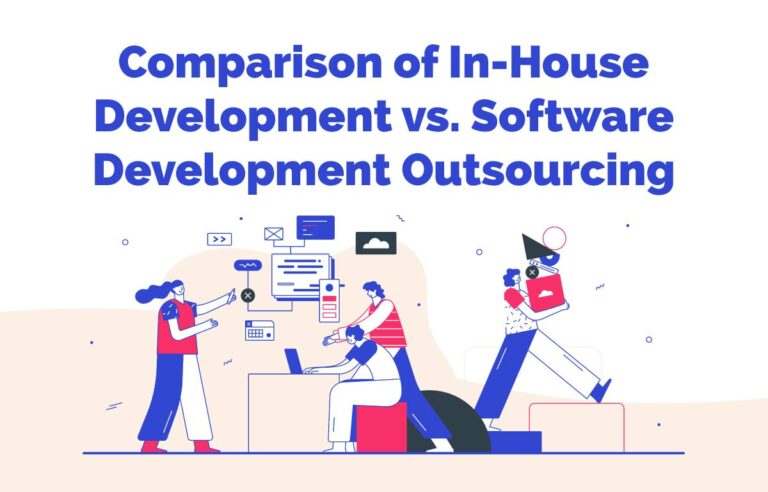Custom Software vs. Standard Software
Comparison of advantages and disadvantages to help you decide which one fits your needs
»

In this guide
- Difference between Standard Software and Customer SoftwareStandard software solutions
Custom software solution - Comparison of strengths and weaknessesOverview of advantages and disadvantages
- Scenarios for either choosing Custom software or Standard SoftwareWhen to choose Standard SoftwareWhen to choose Custom Software
The most important in a nutshell
When to choose Custom Software:
When it comes to applications related to essential and potentially revenue-generating business processes, choosing a custom solution is most likely the right choice.
When to choose Standard Software:
For all standardized business processes, you don’t have to reinvent the wheel all the time and go with a standardized solution.
This article should help you, when you are faced with the question of choosing either a custom developed application or a standard software solution.
Definition of Standard Software and Custom Software
Before discussing the advantages and disadvantages of Custom Software and Standard Software, it’s important to define what is meant by each.
Standard Software Solutions
Standard Software, also named commercial off-the-shelf software (COTS software), is designed for a wide range of users. It targets a broad set of requirements, allowing it to be packaged, marketed and distributed commercially. It usually has a lot of functionalities based on a common set of requirements. Popular examples of standard software are Microsoft Office applications or ERP solutions from SAP or Salesforce.
Custom Software Solution
Custom Software, also called tailored software or bespoke software is developed specifically for the individual requirements and processes of a certain company. Custom software development is used when there is no standard software available on the market covering the desired functionalities. Or when the available solutions don’t fit the required functionalities. Custom Software ist also used when the solution is core to the service delivery or a competitive advantage.

Comparison of strengths and weaknesses
#1 Accuracy of fit
Standard Software can be a good fit for standardizable processes such as CRM, ERP and accounting – processes that almost every business has to deal with. Due to market competitiveness, most of the standard solutions have a broad range of features. However, it is important to note that it may lack key features that are especially necessary for your specific business needs. In some cases – mostly depending on the market penetration of the respective software solution – there are consulting and development companies in the manufactures ecosystem that offer feature extensions and customization of the application to better fit your requirements.
Custom Software, on the other hand, is specifically tailored to meet your unique company needs and remains flexible even as circumstances change. In fact, during the agile process of building your bespoke solution, you may find several opportunities to optimize your existing processes, which leads to higher productivity. Custom software also includes only the features that you need, rather than a bunch of features that you will never use but still have to pay for.
#2 Flexibility
With Custom Software, businesses have full control over the development process, allowing for greater flexibility and customization to meet current and future needs as part of their requirements gathering, and incorporate them into the application. The development team is able to choose when and how often to update the solution.
This is in stark contrast to Standard Software, where users have very limited to no influence over the development process. You can post feature requests but have no control over their implementation. This is because the software provider needs to assess the features business value compared to the development costs, bring it in line with the current backlog and evaluate the risks of new roll outs among their customer base.
#3 Interfaces and integration in your system landscape
Standard Software usually offers limited options for integration with other software solutions. It always depends on the existing interfaces, which tend to become more the longer the Standard Software is on the market. The manufacturer still faces the conflict of interest between opening the solution to be perfectly integratable compared to its cross- and up-selling potentials. Integration in your existing system landscape therefore might be a complex process, as your business processes have to be adapted to the software.
On the other hand Custom Software is tailored to the individual customer’s needs and requirements. Accordingly, the integration of the bespoke solution into the existing business processes is a basic prerequisite per definition. This is especially important for companies that have a lot of legacy systems in place and want to avoid costly interfaces. Custom software adapts to your company’s system landscape and not the other way around.
#4 Availability
Standard Software is immediately available for purchase or rental as in cloud saas solutions. Standard Software has been tested for almost all defects by many users before you. On paper, it is ready to use when it reaches your desk, but in reality – depending on your business process – there might be a lot of customization and integration issues before the solution can be taken fully into production.
While off-the-shelf solutions can give you benefits quickly, the delivery of Custom Software takes months, depending on the set of the required functionality. But you don’t have to wait until all requirements have been shipped. Agile development processes allow you to start with the most compelling requirements and take them in production step by step.
#5 Training & documentation
The use of Standard Software mostly requires intensive training of all employees involved in order to maintain consistent business processes. However, depending on the provider proposition, which is due to hard market competition, product information, tutorials, online help, documentation, user communities, FAQ pages, and training are available to users in a variety of formats.
For Custom Software, requirements were jointly developed with employees through individual needs assessments. A one-time introduction to the new software is mostly sufficient because it has been developed for the way the business wants the application to function. You also save yourself lengthy trial and error periods when “tuning” the software like for ecommerce search engines, because it comes as a perfectly tailored solution.
#6 Support
Standard Software providers include support within their subscriptions or through a separate support agreement. You get access to ticketing systems and dedicated call centers.
If you choose to have an external contractor develop your Custom Software, you can also order a dedicated support with people that know your product and your requirements through participating over the entire development process.
#7 Costs
Standard Software is cheaper in the first place, since it is designed to cover a majority of desired application features and can thus be used by a majority of potential users. Development costs are therefore spread across a large customer base and companies only pay a fraction of the initial development costs. Costs are either one-time with recurring payments for maintenance and support or subscription-based on a monthly or yearly basis. They mostly depend on the number of employees or the scope of the modules in use. Be aware that there can be huge additional costs for the customization in order to make the solution fit to your individual processes when required. Expert consulting rates can be multiples of the costs for developers.
Of course, the cost of Custom Software is higher upfront, because the solution is crafted only for you. But it is a one-time fee. Costs arise from project management, quality assured development and support. If working with an outsourcing development company they can be agreed upon in advance with you.
#8 Lock-in effects
One can say that there is always a lock-in effect with Standard Software: depending on the interference with your business process, you are bound to a software company for a long time. A switch to another provider that better fits your needs can be cumbersome.
With Custom Software you don’t have a locked-in effect, since you have the freedom of choice to develop your solution along your requirements. It’s your software! You can also avoid price hikes for licensing and support from standard solution providers which makes you less invulnerable on the vendor’s business decisions or fortunes.
#9 Data privacy
Data privacy protection in Standard Software is not always up-to-date or in line with the regulations in your company’s country of operation, especially for solutions that are marketed around the world.
In contrast, you have full control of the data privacy protection in your Custom Software to be in accordance with legal requirements and in line with the regulations in your company’s country of operation.
#10 Competetive advantage
Developing Custom Software can give your business a competitive advantage by making it faster, better or more customer oriented than the competition. Custom software can also be used as a marketing tool to offer customers additional benefits that the competition cannot match.
There is no way to differentiate from your competitors with Standard Software. Just because it’s standard.
Overview of advantages and disadvantages of tailored software compared to standard solutions
| Standard Solutions | Custom Solutions |
|---|---|
Accuracy of fit | |
|
|
Flexibility | |
|
|
Interfaces | |
|
|
Availability | |
|
|
Training & Documentation | |
|
|
Support | |
|
|
Costs | |
|
|
Lock-in effects | |
|
|
Data privacy | |
|
|
Competitive advantage | |
|
|
Scenarios for either choosing Custom software or Standard Software
When to choose Standard Software
Standard Software is especially suitable for standardizable processes that are comparable among other companies or are similar in your industry. Examples for standard software solutions are: customer relationship management (CRM), human resources management (HRM), accounting and enterprise resource planning (ERP).
- Best fit for standardized processes
- Quickly usable after purchase
- Cost effective, if interference with other business processes is manageable
When to choose Custom Software
There are several reasons why a business might choose a custom software application. Examples for custom made software are anywhere. You will find them most often on the interface to the customer – to offer individual services and differentiate from the competition.
Custom made software is usually the only solution, if there is no existing software on the market that can meet your needs.
- Business processes are complex and unique
- High need to protect highly sensitive data
- If accuracy of fit, integration into landscape and flexibility are high priorities
- If software is essential to business operations and gives a competitive edge
?
Do you still need further information, deciding on a custom or a standard software?
We are here to help you. Talk to our experts and get a free consultation.

